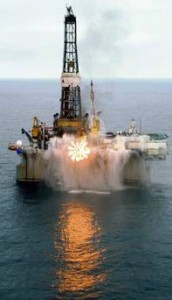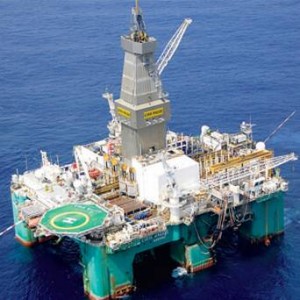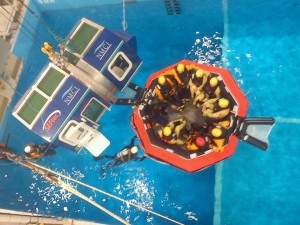Posted: March 4, 2014
Extract from http://www.irishexaminer.com/business/hobbs-turns-his-fire-on-oil-industry-with-campaign-to-maximise-returns-260729.html
“The first phase of Mr Hobbs’s Own Our Oil campaign was the launch of a book yesterday with the same title that aims to change the public’s attitude to Irish oil resources.
The book looks at Ireland’s geology, policy, taxation, history and planning when it comes to the oil industry and is dedicated to former minister Justin Keating who developed a strict taxation regime for Irish resources in the 70s.
The book is the first part of a campaign that is aiming to challenge the oil and gas industry in Ireland. Mr Hobbs warned that if the oil industry attempted to dismiss his campaign he would “take them apart”.
In the book, Mr Hobbs places a lot of emphasis on the difference in regimes between Ireland and Norway. Norway managed to build a sovereign wealth fund three times larger than Ireland’s national debt by effectively managing its natural resources.
However, the chairman of the Irish Offshore Operators’ Association, Fergus Cahill, said comparing the two countries is a fundamental mistake.
“Norway produce two million barrels of oil a day. We produce none. Norway exports natural gas, we import virtually all of ours. To compare the two is a fundamental mistake,” he said.
Mr Hobbs also drew parallels between the oil companies’ behaviour in Norway and Ireland. Mr Hobbs said that in the 1950s Norway was repeatedly told that there was no offshore oil in Norway.
Mr Cahill said that was what the companies believed at the time and it was only with improved technology that the Norweigian industry developed.
Mr Hobbs said they were not interested in trying to unpick any of the licensing options that are in place, but there was a need to try and maximise future returns from potential assets.
Up to a third of Ireland’s marine territory is already under licence from a period between the 1980s and 2007, when exploration terms signed ownership of various assets over to exploration companies, following then minister for energy Ray Burke’s dismantling of the tough taxation regime Justin Keating had put in place.
This means returns from these assets will disproportionately go to company shareholders and not the Irish taxpayer.”
By Vincent Ryan
Business Reporter
© Irish Examiner Ltd. All rights reserved
Sign Up to our Newsletter
Click Here
Posted: May 28, 2013
Providence: Barryroe Well
Nick Webb – 26 May 2013

Providence Resources’ oil find at Barryroe, off the coast of Cork, could generate taxes of €4.5bn over the life of the well, according to a new report from PriceWaterhouseCoopers.
This is the equivalent to the entire annual corporate tax take in Ireland for 2011, according to PwC.
The State, it says, would earn money from the corporate tax and from the windfall taxes generated by the huge find off the south coast.
The PwC report suggests that 10 finds equivalent to Barryroe would have the potential to generate 13,500 jobs during the development phase and 11,500 jobs during the production phase of these fields. An entire new specialist oil services industry would need to be developed near the south coast to cater for the oil fields.
The Barryroe find is a game-changer for the Irish oil industry, as it is the first commercial oil field discovered off Ireland.
Recent months have seen massive activity off Ireland’s coast with the arrival of Kosmos, Cairn Energy and other new parties seeking to explore for oil. Fastnet Oil & Gas last week announced surveys had revealed that its Kinsale acreage could potentially contain up to two billion barrels of oil.
The next two months will prove critical for the future of Tony O’Reilly’s Providence Resources. Results of drilling at its Dunquin well may come through in July, while the €400m-listed firm may also ink a deal to farm out a major chunk of its valuable Barryroe oil field off Cork.
Industry sources believe that Providence may be taken over by an oil major such as Petronas or Exxon if the Dunquin results are positive.
However, at the same time as all this exploration is under way, the Government is examining whether to hike taxes levied on oil finds.
Irish Independent
http://www.independent.ie/business/irish/providence-oil-find-could-generate-45bn-for-state-says-new-report-29297083.html
Sign Up to our Newsletter
Click Here
Posted: April 2, 2013
Extract from Independent.ie Tuesday April 2nd
By John Mulligan

“Oil giant ExxonMobil kicks off a $160m-plus (€125m) drilling programme off the west coast of Ireland this weekend with hopes that confirmation of major fossil fuel reserves will transform the country’s economy.
The US company is planning to drill test wells over a four-month period at two prospects at the Dunquin licence area in the Porcupine Basin, 200km off shore.
Previous data has suggested that there could be over 300 million barrels of oil and 8.5 trillion cubic feet of gas between the two Dunquin prospects.
If they could be proven and then extracted, such finds would mark one of the biggest ever global discoveries of oil and gas and be a game-changer for Ireland’s economic fortunes.
Hidden
But despite the 200 or so wells drilled off Ireland’s shores in the past number of decades, only two have resulted in commercial fields – Kinsale and Corrib.
Both are minnows compared to the prospective resources that could be hidden at Dunquin. Kinsale had about 1.5 trillion cubic feet of gas, while Corrib has about one trillion.
Located at a point in the Atlantic where the ocean is 1.6km deep, ExxonMobil’s drilling programme is being eagerly watched by oil companies from abroad and Ireland, including Petrel Resources, which has an exploration block just 35km away from the Dunquin prospect.
ExxonMobil controls 27.5pc of the Dunquin prospect, with Italian firm Eni holding another 27.5pc.
Spanish energy firm Repsol owns 25pc and UK-based Sosina has a 4pc interest. Irish exploration firm Providence Resources has a 16pc interest in the prospect. A major oil or gas find could catapult its shares higher.
The Dunquin prospect – where the reserves are as deep as 3.6km under the seabed – is one of the most important exploration areas for Providence, which is headed by Tony O’Reilly Jnr.
Providence is also betting that it could have a major oil find on its hands at a site called Barryroe, which is close to the Kinsale field. The company reckons that there could be 280 million barrels of recoverable oil at the Barryroe prospect.”
http://www.independent.ie/business/irish/oil-giant-exxon-starts-160m-drilling-project-off-west-coast-29163728.html

Sign Up to our Newsletter
Click Here
Posted: February 11, 2013
Australia’s oil and gas workers enjoyed the highest average salaries in the industry in 2012 due to a skills shortage, with expatriates pocketing $171,000 a year, a study said on Friday.
Despite uncertain global economic conditions, wages in the oil and gas industry rose globally by 8.5 percent in 2012 to $87,300, according to Hays Oil and Gas Job Search. That follows an average increase of 6.5 percent in 2011.
“There would be few industries with such a track record of growth over the last few years in what has been, in the most part, an uncertain economic environment,” the report said.
World oil production in 2012 grew by 2 percent from the previous year to 89.17 million barrels per day and is expected to increase 1 percent this year, according to the U.S. Energy Information Administration.
Expatriates in Australia topped the list, and Norway came second, according to the survey, conducted among more than 25,000 employees. Among local hires, Australians workers were also the highest earners, with an average wage of $163,600.
“At the top of this year’s table, we once again see Australia and Norway. Both countries have limited skilled labour pools and significant workloads. The result is very high pay rates, although both would appear to have met some sort of ceiling,” the report said.
Australia is preparing to become one of the world’s largest liquefied natural gas (LNG) exporters, with 190 billion Australian dollars ($196.2 billion) worth of projects currently underway, requiring a vast workforce.
The average wage in the United States was significantly lower at $123,800. At the other end of the spectrum were expatriates in Sudan, who according to the survey, earned $59,800 in 2012. Wages tumbled in Iran, whose oil and gas production contracted last year as a result of Western sanctions over its disputed nuclear programme. The average expatriate salary in Iran dropped 27 percent in 2012 to $68,100, while the average for local employees fell 10 percent to $46,900, the study found. “Where imported salaries are concerned, it is once again the frontiers of the industry that are pushing the upper limits of pay. Representing a mix of danger money and hardship allowance in these base salaries, we find Russia’s Arctic exploration driving imported skills, and China’s drive on non-conventional skills also pulling in experts on premium rates,” Hays Oil and Gas Job Search said. The risks involved in some exploration and production regions were laid bare last month in Algeria, where Islamist gunmen attacked a gas plant, which led to the deaths of at least 38 local and foreign workers. Expatriate salaries in Algeria averaged $92,400 last year, according to the survey, which was conducted before the attack. As for areas of expertise, vice presidents and directors of subsea pipeline projects earned the highest average wages at $251,200, up 9 percent from 2011. Graduate salaries increased 12 percent to just under $40,000 in 2012. In an industry counting around 5 million people across the world, 47.4 percent are expatriates, with the remainder employed locally, the report said. ( C) Reuters
For more information and news please see http://www.fxcentre.com/news.asp?3033334
Sign Up to our Newsletter
Click Here
Posted: June 14, 2012
The Strategic Marine Alliance for Research and Training have introduced the

The module is designed for those who wish to gain practical skills in at sea sampling and data collection and is geared towards the training requirements of postgraduate students and researchers, marine agency and industry personnel, and those wishing to develop a career in applied marine biology. A description of the module with instructor biographies, application forms for the module and a module poster can be downloaded at the bottom of the page. Completion of the module results in the award of 5 ECTS credits at postgraduate level 9.
Twenty places are available on this accredited postgraduate module which will run between Monday the 1st of October and Friday the 26th October 2012.
Week 1 is composed of mentored student centered distance learning.
Week 2 consists of three days of laboratory practicals and lectures in Galway-Mayo Institute of Technology and four days shiptime divided between the Celtic Voyager and Celtic Mist research vessels off Cork and in the Shannon Estuary respectively. For the shiptime components, there will be a maximum of ten students per vessel per day.
Weeks 3 and 4 consist of student centered distance learning leading towards the submission of a project report.
Fees for the module are €750. Completed application forms should be submitted no later than the 20th of July 2012.
For further information please email smart@gmit.ie
http://www.smartseaschool.com/content/postgraduate-accredited-module-applied-marine-biological-sampling-and-data-collections
If you would like any information on this or similar courses such as corporate team building, OPITO training Ireland, FOET courses and Bridge Simulation – call us today or email us at reception@nmci.ie.
Sign Up to our Newsletter
Click Here




Connect with NMCIS